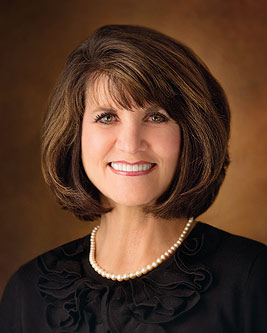Latter-day Saint scriptures teach that every person God creates is given gifts, talents, traits, and experiences from Him to be used to help others as well as to bless our own lives. They are His gifts to us, and what we choose to do with them is our gift to God. It does no good, for instance, to be given a gift to teach powerful spiritual messages if we refuse to learn about Jesus or turn down an opportunity to teach Sunday School.
11 For all have not every gift given unto them; for there are many gifts, and to every man is given a gift by the Spirit of God.
12 To some is given one, and to some is given another, that all may be profited thereby. (See Doctrine and Covenants 46: 11-12.)
Everyone, male and female, can receive spiritual gifts. The scriptures list many of these gifts and it can be interesting, as we read, to highlight each gift mentioned. The gifts bless the holder of the gifts if he uses them wisely, but they can also be used to bless others. A person who has the gift of faith can use it to find the truth among conflicting and confusing choices. This gift can be used to help that person become a member of the Savior’s Church. It comes to her through the Spirit of Christ. After receiving the gift of the Holy Ghost, her faith grows even more. She might then choose to use that gift to pray for others or to share her faith with those who were not given as strong a gift as she received.
We’re taught that it is appropriate to pray for certain gifts if we are prepared to use them wisely in the service of others rather than to glorify ourselves. A person who is invited to teach a class but lacks the gift to teach can begin to pray for it. In addition to praying, of course, she must do what she can to improve her teaching skills, but God will step in and honor righteous requests if they are part of His plan for us. A prayer to become the greatest teacher in the world is not likely to be honored because this is a prideful request, but a prayer to have the ability to teach the class one has agreed to teach will likely be honored.
The diversity of the human race is one of God’s best ideas! If we all had the same talents, gifts, and assignments, most things wouldn’t get done. The world needs writers, but it doesn’t need everyone to be a writer. It needs gardeners, but everyone doesn’t need a talent for gardening. Because each of us has different talents and passions, everything that needs doing gets done. If we each had all the talents possible in equal proportion, we might find ourselves spread too thin and most things wouldn’t get accomplished. We’d all be doing whatever was easiest or created the most wealth, given human nature.
In the same way, God divided up certain tasks and assigned them to specific genders. Only women were given the ability to give birth. This doesn’t mean God loves men less; it only means that doesn’t happen to be one of the tasks assigned to them. Only men hold the priesthood, but that does not say women aren’t worthy or capable of holding it. Priesthood is an office, not a gender, but assigning it to men keeps it focused, just as assigning childbirth only to women keeps that aspect of life focused.
 Within The Church of Jesus Christ of Latter-day Saints, there are a great many tasks to be completed because we have a lay religion and very complex programs. Everyone is asked to take on his or her share of the work. Tasks are assigned in various ways that make the Church run more smoothly. Some are assigned by age: only an eleven, twelve, or thirteen-year-old old girl may serve as a youth leader in the Beehive Program. (Beehives are girls of that age in the Young Women’s program for teenagers.)
Within The Church of Jesus Christ of Latter-day Saints, there are a great many tasks to be completed because we have a lay religion and very complex programs. Everyone is asked to take on his or her share of the work. Tasks are assigned in various ways that make the Church run more smoothly. Some are assigned by age: only an eleven, twelve, or thirteen-year-old old girl may serve as a youth leader in the Beehive Program. (Beehives are girls of that age in the Young Women’s program for teenagers.)
Other callings and responsibilities are assigned by gender. For example, only women can serve as Primary or Relief Society presidents. (These are, respectively, the organizations for children and women.) Some tasks are open to anyone who is an adult: anyone may teach the children or the literacy classes, even though only women can lead those programs. Some tasks are assigned by office: only a person who holds the office of a high priest can serve as a bishop (the leader of a congregation). It might appear that the rule is that only men can be bishops, but actually, the rule is that only high priests can be bishops. A good and worthy man who does not hold the office of high priest in the priesthood cannot be a bishop, no matter how qualified he is otherwise.
While it’s true that only men are to hold the priesthood (as we see from even a casual study of the Bible), this does not limit a woman from serving God anymore than not being able to be the Primary president limits a man’s ability to serve God. There are many ways to serve and God does not love the priesthood holders more than the Primary president—or the door greeter. We don’t get bonus points for serving in certain kinds of positions. God asks us to serve wherever He needs us, and, if we do this well, we are blessed for our attitude and willingness to serve, not for the specific task accomplished.
Men holding the priesthood receive no special blessings over the women. It isn’t about power, blessings, or God’s love. Rather, it is about our trust in God and His plan. If we have a testimony that the Savior is at the head of the Church and that He sees with a vision greater than our own, we won’t waste valuable hours of our mortality fretting over what gifts or offices we don’t have. Instead, we’ll work hard to develop those gifts and talents that God has asked us to take on.
As with every other aspect of the gospel, it really comes down to a testimony. How much do you trust God?
When I was first investigating the Church, the priesthood concerned me. As a teenager raised in the 1970s, I thought women’s liberation was what I was supposed to be living (even though I was known for my love of taking care of children). In other words, my nature was fairly traditional—if you leave out housework. The missionaries teaching me, when asked about priesthood during the first lesson, told me they’d be happy to discuss it with me but that I needed more background and training in prayer first.
 They asked me to learn to pray and to continue to study, and then we’d discuss it. By the time I was able to understand the answers, I no longer needed to ask the question. I had learned to get my own answers through prayer and I had come to see how much God valued the woman’s place in His kingdom. I understood that being told I had to turn into a man was degrading to women and insulting to God, who created gender. It was no longer a problem for me. I had become proud of the person God created in me.
They asked me to learn to pray and to continue to study, and then we’d discuss it. By the time I was able to understand the answers, I no longer needed to ask the question. I had learned to get my own answers through prayer and I had come to see how much God valued the woman’s place in His kingdom. I understood that being told I had to turn into a man was degrading to women and insulting to God, who created gender. It was no longer a problem for me. I had become proud of the person God created in me.
Over the years, I’ve longed for certain gifts. Some I’ve been able to receive, such as an improved ability to teach, while others were not my calling, such as a desire to sing. Over the years, as I’ve grown and matured, I’ve stopped wasting time fretting over what I don’t have and have begun to be thankful for what I do have. God gave me a most interesting gift box of traits, talents, and experiences. I would be ungrateful and unworthy of those gifts if I wasted my life whining that they weren’t good enough.
This article was originally published in October 2009. Minor changes have been made.
About Terrie Lynn Bittner
The late Terrie Lynn Bittner—beloved wife, mother, grandmother, and friend—was the author of two homeschooling books and numerous articles, including several that appeared in Latter-day Saint magazines. She became a member of the Church at the age of 17 and began sharing her faith online in 1992.






